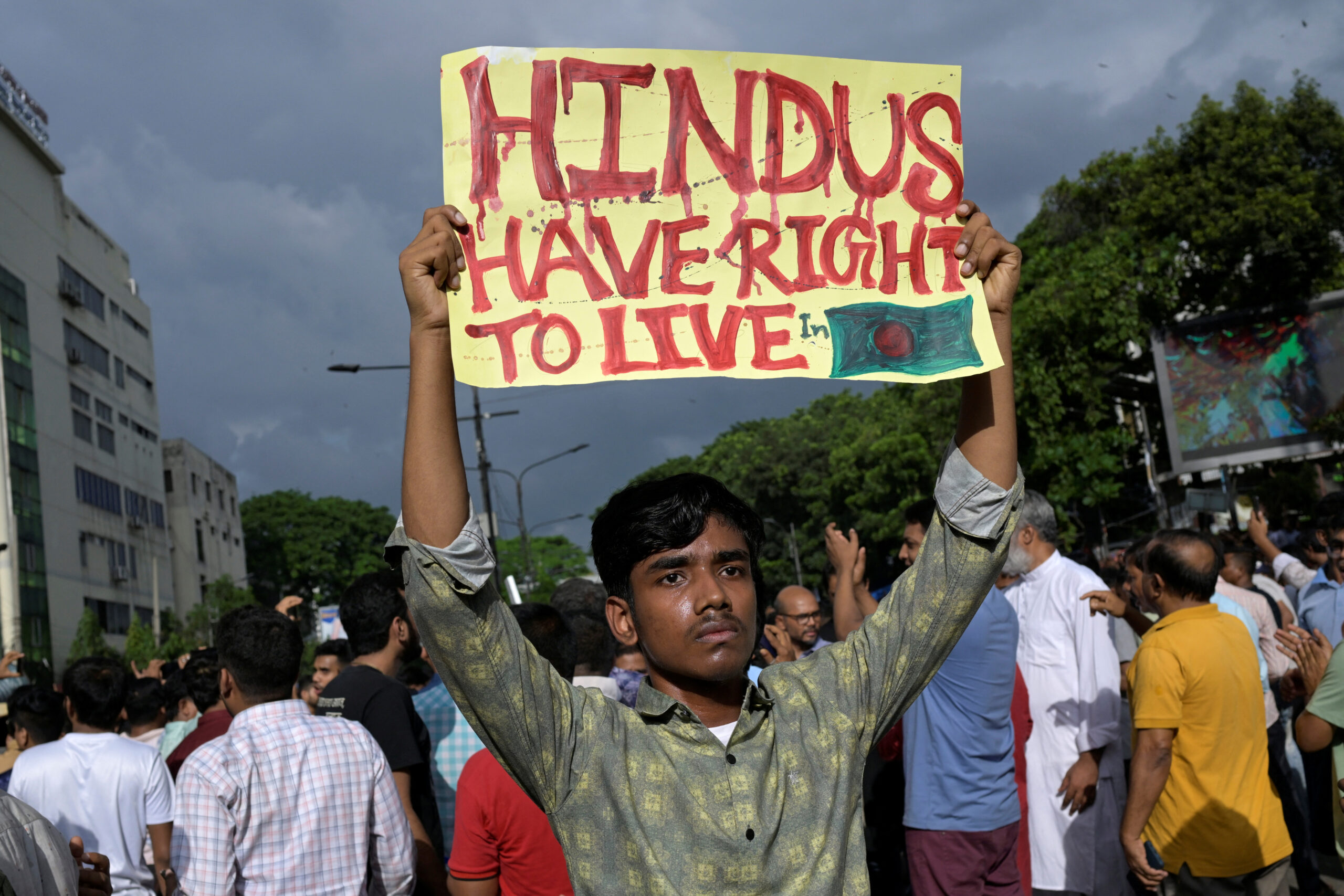- Wednesday, April 02, 2025
Hindu groups are debating whether to establish a separate political party or demand reserved parliamentary seats to protect their rights

By: Shajil Kumar
HINDU community leaders in Bangladesh are advocating for the formation of a dedicated political party, reflecting an urgent call for political representation to protect their rights and ensure their safety.
Leaders from the Bangladesh Hindu Buddhist Christian Unity Council (BHBCOP) and other groups have been at the forefront of discussions about establishing a separate political party or demanding reserved parliamentary seats.
“There are currently three opinions that are being discussed in detail: first, going back to the separate electorate system from 1954; second, establishing a separate political party for Hindus; and third, reserving seats in Parliament for minorities,” BHBCOP presidium member Kajal Debnath told PTI.
In the wake of unprecedented violence and political upheaval in Bangladesh, the Hindu community – the largest minority community in Bangladesh – stands at a pivotal crossroads.
The turmoil began after the resignation of Prime Minister Sheikh Hasina on August 5 following a student movement, a moment that triggered widespread protests and chaos.
Debnath said the data collected by the BHBCOP points to 2,010 incidents of attacks on the Hindu community, ranging from murder and physical assaults to sexual assaults, attacks on temples, and destruction of property.
There are no official figures from the Bangladesh government on the number of attacks.
“The discussions and exchanges of opinions regarding forming a political party are at the top of our priority. Although nothing has been finalised, let’s see how it pans out,” said Ranjan Karmakar, a leader from the Hindu community.
“The proposed political party could serve as a critical vehicle for change, ensuring their concerns are represented and addressed,” he pointed out.
Historically, Hindus made up about 22 per cent of Bangladesh’s population during the 1971 Liberation War, but today they are only around 8 per cent.
The community members attributed this decrease in the Hindu population to socio-political marginalisation and sporadic violence, intensifying the urgency for political mobilisation.
Debnath opined that forming a party for Hindus may not work in favour of minorities, as it might divide the secular votes and not result in victory.
“We must focus on our common goals. Only by standing united can we make a significant impact. This is our moment to rise and reclaim our place in the political landscape. But as a large section of Hindus are identified with the Awami League, we too are facing attacks,” said Gobinda Chandra Pramanik, also general secretary of the Bangladesh Jatiya Hindu Mohajote.
Debnath pointed out that reserving parliamentary seats similar to how it is done for women could be a solution. “If we have representatives in Parliament, they can actively advocate for our safety, security, and cultural preservation. Without representation, we risk being forgotten in political discussions, left to navigate a hostile environment alone,” he said.
Another presidium member of BHBCOP, who did not wish to be named, stated that the political parties—whether the Awami League, the Bangladesh Nationalist Party (BNP), or the Jatiya Party—have failed the Hindu minorities in the country since its birth following the Liberation War of 1971.
“Since 1971, minorities have failed to feature in the political discourse of the country. This is mainly because minorities have depended on mainstream political parties, who have time and again failed us, except when reaching out to us during elections,” he said.
Historically, the Awami League, recognised for its secular stance, received substantial support from the Hindu community, but the sudden power vacuum resulted in a wave of violence that disproportionately affected Hindus, leading to vandalised businesses, destroyed properties, and desecrated temples, leaving many in the community feeling vulnerable and disenfranchised.
Muhammad Yunus, the interim government’s Chief Adviser, downplayed the severity of the violence against Hindus, characterising it as politically motivated rather than communal and suggesting that the attacks stemmed from political upheaval due to the perception that most Hindus supported the now-deposed Awami League regime.
Political analyst Zillur Rehman expressed doubts about the number of attacks on Hindus produced by the BHBCOP but asserted that the proposal of reservation of seats in parliament can be discussed.
“Right now a process is on to relook at our Constitution so this idea of allocation of parliamentary seats for the minorities can be discussed and debated. But the idea of forming a new political party won’t be feasible in the binary of BNP and Awami League,” he said. (PTI)